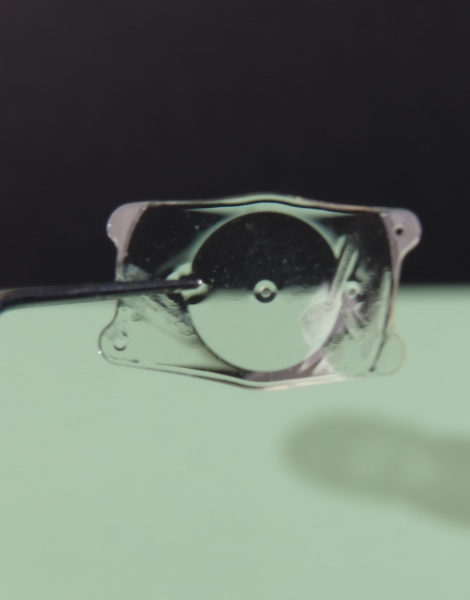What is EVO ICL surgery?
EVO ICL is an Implantable Collamer® Lens by Staar Surgical. Implantable lenses are refractive implants to correct common vision issues like myopia (nearsightedness) and astigmatism. Unlike other vision correction options, the EVO ICL is an additive technology that corrects vision without the removal of any corneal tissue.
EVO ICL is a permanent, implantable contact lens; it is detachable, modifiable, and biocompatible, and increases day and night vision. The EVO ICL surgery enhances vision without needing eyeglasses or contact lenses.
EVO ICL received FDA approval in March of 2022 and has seen great patient satisfaction.

What happens during an ICL procedure?
Before you schedule the EVO ICL procedure the eye surgeon will perform a series of tests to measure your eye’s unique characteristics. Your ophthalmologist will use these tests to determine whether the EVO Visian ICL procedure is a good option for you.
During this consultation, your surgeon will also go over the procedure, the lens, and your expected outcome.
EVO ICL implantation is an outpatient procedure — meaning you won’t have to stay overnight at a hospital.
The procedure is quick and easy, usually taking less than 30 minutes. Your eyes will be dilated and numbed with eye drops so you won’t feel a thing during the procedure.
The surgeon uses a laser to create a small incision in the eye and the EVO ICL is placed right on top of your natural lens — unlike other surgeries that involve removal and replacement of the lens.
Which is right for you—EVO ICL vs LASIK?
Vision correction surgery is a dream come true for people who want to free themselves of the hassle and financial burden of wearing glasses and contact lenses.
LASIK (laser-assisted in situ keratomileusis) is an FDA-approved laser eye procedure that reshapes the cornea to correct myopia (nearsightedness), hyperopia (farsightedness), and astigmatism (blurry or distorted vision).
LASIK is the most recognized type of laser eye surgery and the most widely performed. Because it’s less invasive and more cost-effective, LASIK tends to be the popular option for patients who qualify as good candidates.
The EVO Visian ICL procedure is an excellent choice for patients when the LASIK procedure is contraindicated.
While they both correct your vision without glasses or contacts, there are some differences between the two options:
Removal of corneal tissue
Laser vision correction procedures such as LASIK and PRK contour the cornea to fix refractive errors. Shaping the cornea in this way involves removing corneal tissue. High levels of nearsightedness (high refractive error) may not be eligible for laser vision correction because too much tissue would need to be removed.
The EVO ICL is suitable for more extreme levels of error and astigmatism because none of the eye’s natural tissue needs to be removed.

Reversibility
The results of LASIK are irreversible; there’s no ability to restore the cornea to its previous condition. Occasionally, laser surgical procedures may over- or under-correct, this requires a second LASIK procedure.
Because the ICL is placed above the natural lens, it is removable if necessary.
Eye conditions
Visian ICL is recommended for patients with thin corneas, dry eye syndrome, keratoconus (a cone-like bump on the cornea), and other eye condition where LASIK is contraindicated.
UV protection
Much like traditional contacts, Visian ICLs offer UV protection that protects the eye from sun damage. This protection is made possible because the ICL sits on top of the eye’s natural lens.
Risk of infection
Visian ICL has a higher risk of infection because it involves placing a “foreign object” inside the body. While the risk is low, it is a higher risk than patients have with LASIK.
Glaucoma risk
It is important to work with a trusted and skilled ophthalmologist. If your ICL is improperly sized, the pressure can increase your risk of glaucoma.
Biocompatibility
The EVO ICL is made from a material called collamer, which is derived from collagen. The body naturally produces collagen, it’s a significant part of what keeps skin soft and the bones healthy. Collagen allows the EVO ICL to be highly biocompatible with the natural chemistry of the eyes.
Age requirements
The FDA recommends LASIK if you’re age 18 or older. ICL is generally indicated for use in patients 21–45 years old.
Farsightedness
LASIK corrects farsightedness. The EVO ICL does not.
Are the EVO ICL and LASIK similar?
While LASIK and ICLs are very different vision correction procedures, they have some similarities.
- Both have a refraction error correction of 20/40 visual clarity or better.
- Recovery time for both LASIK and EVO ICL surgery is brief. Most patients can resume regular activity within a few days after the procedure.
- According to American Refractive Surgery Council, the most common LASIK side effects patients experience include dry eye, glare, halos, or night vision symptoms during the healing process. EVO ICL surgery recipients can have the same temporary side effects after surgery.
- Both correct nearsightedness and astigmatism.
How long does EVO ICL last?
The EVO Visian ICL is meant to remain in place indefinitely. However, even though it is considered permanent, it is completely reversible and can be removed or replaced.
Why choose Assil Gaur Eye Institute for your ECO IVL surgery?
Los Angeles’ leading LASIK, cataract, and retinal surgeons are available to you, all in one practice. State-of-the-art treatments for all eye conditions, including glaucoma, macular disease, dry eye, and diabetic eye conditions, to name just a few.
Assil Gaur Eye Institute remains laser-focused on our founding mission of providing exceptional eye care in a compassionate and caring environment. We continue to be driven to advance the field of ophthalmology and give back to our community every day.
Please call (866) 945-2745 or make an appointment online.
We are conveniently located for patients throughout Southern California and the Los Angeles area at locations in or near Beverly Hills, Santa Monica, West Los Angeles, West Hollywood, Culver City, Hollywood, Venice, Marina del Rey, Malibu, Manhattan Beach, and Downtown Los Angeles.













